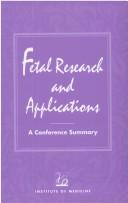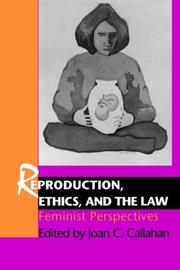| Listing 1 - 3 of 3 |
Sort by
|

ISBN: 0309051762 0309573416 0585142920 9780585142920 9780309051767 Year: 1994 Publisher: Washington, DC National Academy Press
Abstract | Keywords | Export | Availability | Bookmark
 Loading...
Loading...Choose an application
- Reference Manager
- EndNote
- RefWorks (Direct export to RefWorks)
Fetal tissues --- Fetus --- Fetal Tissue Transplantation --- Research --- Congresses. --- Transplantation. --- congresses. --- Tissue Transplantation --- Embryonic Structures --- North America --- Publication Formats --- Science --- Congresses --- United States --- Natural Science Disciplines --- Publication Characteristics --- Americas --- Anatomy --- Transplantation --- Geographic Locations --- Surgical Procedures, Operative --- Disciplines and Occupations --- Geographicals --- Analytical, Diagnostic and Therapeutic Techniques and Equipment --- Surgery & Anesthesiology --- Transplantation of Organs & Tissues --- Health & Biological Sciences --- Foetus --- Unborn child --- Fetal tissue --- Embryology --- Reproduction --- Tissues
Book
ISBN: 1848827172 9786613087331 1848827180 1283087332 Year: 2011 Publisher: New York : Springer,
Abstract | Keywords | Export | Availability | Bookmark
 Loading...
Loading...Choose an application
- Reference Manager
- EndNote
- RefWorks (Direct export to RefWorks)
Regenerative Medicine Using Pregnancy Specific Biological Substances is an international attempt to bring researchers working on the potential uses of pregnancy specific biological substances in regenerative medicine, under one umbrella. More than 72 distinguished authors from five continents have contributed in the 40 chapters of the book. It will be a good reference source, not only for practicing clinicians, but also for those interested in research in immunotherapy; stem cell therapy; regenerative therapy and various specialities such as cardiology, neurosurgery and cardiothoracic surgery. This book brings together some of the important work that is being done along with unpublished observations that will help to shape the contours of future therapy in the field of modern regenerative medicine. It promises to be an eye-opener to the enormous potential of hitherto discarded material that had been so far considered as a pure biological waste. The book will have served its purpose if it acts as a stimulant to professionals and clinical scientists who can build on the knowledge and expand the curative potential of pregnancy-specific biological substances.
Degeneration (Pathology). --- Pregnancy. --- Regenerative medicine. --- Tissue engineering. --- Regenerative medicine --- Placenta --- Fetal blood --- Amniotic liquid --- Fetal tissues --- Stem Cell Transplantation --- Investigative Techniques --- Medicine --- Tissue Transplantation --- Cell Transplantation --- Transplantation --- Analytical, Diagnostic and Therapeutic Techniques and Equipment --- Health Occupations --- Disciplines and Occupations --- Surgical Procedures, Operative --- Cord Blood Stem Cell Transplantation --- Methods --- Regenerative Medicine --- Fetal Tissue Transplantation --- Human Anatomy & Physiology --- Health & Biological Sciences --- Pathology --- Physiology --- Placenta. --- Fetal blood. --- Amniotic liquid. --- Fetal tissues. --- Fetal tissue --- Liquor amnii --- Cotyledon (Anatomy) --- Cord blood --- Umbilical cord blood --- Medicine. --- Gene therapy. --- Internal medicine. --- Blood transfusion. --- Hematology. --- Surgical transplantation. --- Medicine & Public Health. --- Blood Transfusion Medicine. --- Transplant Surgery. --- Gene Therapy. --- Internal Medicine. --- Tissues --- Body fluids --- Embryology --- Pregnancy --- Blood --- Uterus, Pregnant --- Regeneration (Biology)

ISBN: 025320996X 0253329388 Year: 1995 Publisher: Bloomington Indiana university press
Abstract | Keywords | Export | Availability | Bookmark
 Loading...
Loading...Choose an application
- Reference Manager
- EndNote
- RefWorks (Direct export to RefWorks)
"Reproduction, Ethics, and the Law" addresses some of the most pressing moral and legal quandaries in contemporary society - those revolving around human reproduction. Technology can both limit and assist childbearing. Courts have assigned legal parenthood to genetic parents of children carried to term by women genetically unrelated to them, and courts have also passed over genetic progenitors to assign parenthood to individuals socially related to children. With developments in medical and surgical interventions for foetus', we have also seen court cases holding women responsible for causing prenatal harm, as well as a landmark Supreme Court decision that might well release industry from liability for causing prenatal harm in the workplace. Scientists are able to use tissue from aborted fetuses to substantially alter the quality of life for persons afflicted with progressive, debilitating disease, and they are now able to fertilize and implant in women's wombs eggs harvested from aborted female fetuses. Physicians are able to sustain infants with no hope for characteristically human lives long enough to make their organs available to other infants in vital need; and they are able to perform prenatal diagnoses that encourage elective abortion. This collection of essays adds to the feminist dimension of the public discussion of how these issues should be addressed. The contributors broaden the discussion considerably in focusing on issues beyond abortion and reproductive technologies, bringing together such themes as surrogacy, adoption, and infertility; frozen embryos and fathers rights; RU 486; foetal harm; and industrial health hazards for women. This volume brings together feminist social and philosophical theory with a practical awareness of concrete social problems and an understanding of new technologies. The contributors are Barbara J. Berg, Joan E. Bertin, Joan C. Callahan, Janet Gallagher, Helen B. Holmes, Joan Mahoney, Mary B. Mahowald, Uma Narayan, Christine Overall, Laura Purdy, Mary L. Shanley, Janice G. Raymond, Patricia Smith, and Rosemarie Tong.
Feminism--Philosophy --- Feminist sociology --- Feminist theory --- Feministische theorie --- Theory of feminism --- Théorie féministe --- Feminist theory. --- Human reproductive technology --- Government policy. --- Moral and ethical aspects. --- Social aspects. --- reproductieve technologie --- feminisme (feministische visie) --- ouderschap --- abortus (vrijwillige zwangerschapsafbreking) --- anticonceptie (voorbehoedsmiddelen, contraceptie, geboortecontrole) --- embryo-onderzoek (embryo's in vitro) --- sekseselectie (geslachtsselectie) --- technique de reproduction --- féminisme --- parentalité --- avortement (interruption volontaire de grossesse, IVG) --- contraception (contrôle des naissances) --- recherche sur l'embryon (embryons in vitro) --- sélection de sexe (choix du sexe) --- Humanism --- Parents --- Therapeutics --- Genetic Engineering --- Persons --- Health Care Economics and Organizations --- Embryonic Structures --- Ethics, Clinical --- Patient Rights --- Diseases --- Prenatal Injuries --- Germ Cells --- Sexual Behavior --- Estrenes --- Health Behavior --- Family Relations --- Investigative Techniques --- Economics --- Genital Diseases, Male --- Genital Diseases, Female --- Sociology --- Tissue Preservation --- Preservation, Biological --- Tissue Transplantation --- Patient Acceptance of Health Care --- Environmental Pollutants --- Maternal Behavior --- Technology, Industry, and Agriculture --- Delivery, Obstetric --- Psychology, Social --- Reproductive Physiological Phenomena --- Women --- Mental Disorders --- Socioeconomic Factors --- Reproductive Physiological Processes --- Reproductive Techniques, Assisted --- Social Problems --- Insemination --- Social Sciences --- Obstetric Surgical Procedures --- Chemicals and Drugs --- Family --- Behavior --- Technology, Industry, Agriculture --- Named Groups --- Histocytological Preparation Techniques --- Psychiatry and Psychology --- Analytical, Diagnostic and Therapeutic Techniques and Equipment --- Ethics, Professional --- Pregnancy Complications --- Surgical Procedures, Operative --- Health Care --- Transplantation --- Anatomy --- Toxic Actions --- Ethics --- Anthropology, Education, Sociology and Social Phenomena --- Male Urogenital Diseases --- Genitalia --- Genetic Techniques --- Attitude to Health --- Female Urogenital Diseases --- Population Characteristics --- Behavior and Behavior Mechanisms --- Nuclear Family --- Reproductive and Urinary Physiological Phenomena --- Specimen Handling --- Cells --- Estranes --- Philosophy --- Phenomena and Processes --- Steroids --- Laboratory Techniques and Procedures --- Chemical Actions and Uses --- Delivery of Health Care --- Female Urogenital Diseases and Pregnancy Complications --- Urogenital System --- Humanities --- Histological Techniques --- Cytological Techniques --- Polycyclic Compounds --- Diagnosis --- Health Care Quality, Access, and Evaluation --- Clinical Laboratory Techniques --- Cryopreservation --- Infertility --- Insemination, Artificial --- Spermatozoa --- Tissue Donors --- Fathers --- Poverty --- Sex Preselection --- Civil Rights --- Homosexuality --- Human Rights --- Social Control, Formal --- Oocyte Donation --- Treatment Refusal --- Ethics, Medical --- Feminism --- Government Regulation --- Prejudice --- Sexuality --- Abortion, Eugenic --- Fees and Charges --- Mifepristone --- Industry --- Reproductive Techniques --- Cesarean Section --- Fetal Tissue Transplantation --- Disabled Persons --- Maternal-Fetal Relations --- Parent-Child Relations --- Reproduction --- Jurisprudence --- Internationality --- Pharmaceutical Preparations --- Prenatal Exposure Delayed Effects --- Embryo, Mammalian --- Pregnancy --- Surrogate Mothers --- Substance-Related Disorders --- Pregnant Women --- Women's Rights --- Abortion, Induced --- Adoption --- Fetus --- International Cooperation --- Hazardous Substances --- Contraception --- Minority Groups --- Medicine --- Health & Biological Sciences --- Gynecology & Obstetrics --- Moral and ethical aspects --- Social aspects --- Government policy --- Human reproductive technology - Government policy. --- Assisted human reproduction --- Assisted conception --- Conception --- Human assisted reproduction --- Human reproduction --- Medical technology --- Reproductive technology --- Feminist philosophy --- Technological innovations --- Assisted human reproductive technology --- Human assisted reproductive technology
| Listing 1 - 3 of 3 |
Sort by
|

 Search
Search Feedback
Feedback About UniCat
About UniCat  Help
Help News
News